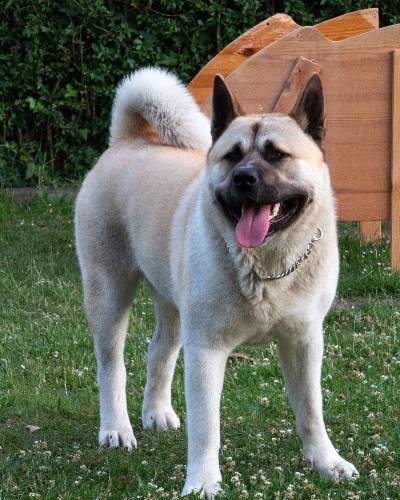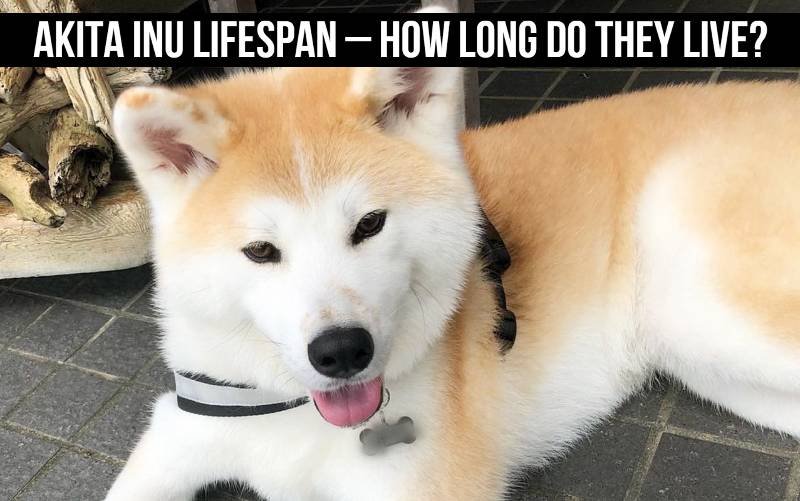Akita Inu’s are beautiful dogs, but before you bring one into your home, it’s important to understand how long they typically live and what you can do to keep them healthy.
Most dog breeds have an average lifespan of 10-12 years. However, the Akita Inu is known to have a lifespan of 10-14 years. This means that if you’re lucky enough to adopt an Akita Inu, you’ll enjoy many happy years together.
Everyone loves a happy ending, and when it comes to the Akita Inu dog breed, that means owners will enjoy a lengthy lifespan with their loyal companions. But just how long do Akitas live, on average? And what kind of care and treatment will ensure your pup enjoys a great life? Here’s everything you need to know about the Akita Inu breed and its lifespan.
What is the Average Akita Inu Lifespan?
The average Akita Inu lifespan is about 10-12 years. Some rare Akitas have been known to live up to 15 years or more, but this is not the norm. Factors such as diet, exercise, and overall health can affect a dog’s lifespan, and Akitas are no different.

Akita Inu Lifespan Chart
The following chart is based on a survey of Akita Inu’s lifespan conducted by us by taking data from various sources.
| Akita Age in years | Percentage of Akitas |
|---|---|
| 10-12 | 85% |
| 13-15 | 13% |
| 16+ | 2% |
What Can Affect the Lifespan of An Akita?
Genetics:
Genetics greatly affect the lifespan of the Akita. Some Akitas may inherit health problems that can shorten their life expectancy.
DR Quote
“The Akita breed is known to have a genetic predisposition for certain health conditions such as hip dysplasia and autoimmune disorders, which can potentially affect their lifespan.” -Dr. Jennifer Brown, veterinarian and genetics specialist
A study published in the Journal of the American Veterinary Medical Association found that Akitas with hip dysplasia had a significantly reduced lifespan compared to those without the condition.” -Dr. Sarah Johnson, veterinarian and researcher
Environment:

Living in a stressful environment can also affect the lifespan of an Akita. Constant noise, lack of exercise, and inadequate socialization can lead to behavioral issues and decreased lifespan.
A study conducted by the University of California found that Akitas living in environments with ample exercise and socialization opportunities had a lifespan on average two years longer than those living in sedentary environments.
Diet:
What an Akita eats can also play a role in how long it lives. A diet that is high in fat and calories can lead to obesity, which puts stress on Akita’s organs and can shorten its lifespan. Conversely, a diet that is lacking in nutrients can also cause health problems that may reduce an Akita’s life expectancy.
Exercise:
The amount of exercise an Akita gets can also influence its lifespan Akitas that get plenty of exercises are typically healthier and tend to live longer than those that do not get enough physical activity.
Overall health:
The overall health of an Akita can also be a determining factor in its lifespan. Akitas that are kept up-to-date on vaccinations and routine vet care are more likely to live longer than those that are not. Chronically ill Akitas may have a shorter lifespan than those without any health issues.
The Akita’s lifespan is greatly affected by genetics, environment, nutritional intake, physical activity, and overall health.
The best way to ensure that your Akita has an active and healthy life span is to provide it with proper medical care, a nutritious diet, and plenty of exercise.
7 Tips To Ensure Your Akita Inu Lives A Long And Healthy Life
Akitas are a robust and hardy breed, but like all dogs, they are susceptible to health problems. The best way to keep your Akita healthy is to provide him with proper nutrition, exercise, preventive care, and prompt treatment of any illness or injury.
Here are seven tips for ensuring your Akita enjoys a healthy lifespan:
Feed your Akita a high-quality diet.
Akitas are high-energy dogs and require a diet that is rich in protein and fat. Look for a commercial food that is specifically formulated for large breeds and provides all the nutrients your dog needs. Avoid feeding your Akita table scraps, as this can lead to obesity and other health problems.
Get your Akita regular exercise.
Akitas need plenty of exercise to stay healthy and fit. A daily walk or run is a great way to meet your dog’s exercise needs. If you have the space, letting your Akita run around in a fenced-in yard is also a good option.
Take your Akita to the vet for regular checkups.
Preventive care is important for all dogs, and Akitas are no exception. Take your dog to the vet for yearly checkups and vaccinations, and be sure to keep up with routine worming and flea/tick prevention.
Brush your Akita’s teeth regularly.
Akitas are no exception when it comes to dental care. Be sure to brush your dog’s teeth at least once a week to help prevent gum disease and tooth decay.
Keep your Akita’s nails trimmed.
Long nails can be uncomfortable for your dog and can also lead to health problems. Be sure to keep your Akita’s nails trimmed, and if you’re not comfortable doing it yourself, ask your vet or groomer to do it for you.
Spay or neuter your Akita.
Not only does spaying or neutering help reduce the risk of certain health problems, but it can also help make your Akita a better companion by reducing unwanted behaviors such as roaming, barking, and aggression.
Be prepared for emergencies.
Keep your Akita’s medical records up to date and be sure to have a list of emergency contacts, including your vet’s phone number, in case you need it. It’s also a good idea to keep a first-aid kit specifically for your dog and to know how to perform CPR in case of an emergency.
By following these tips, you can help ensure your Akita lives an active and healthy existence.
FAQs
Do Akita Inu have a short lifespan?
The lifespan of an Akita Inu is not short. The average lifespan of an Akita Inu is 10-12 years, which is about the same as the average lifespan of other dog breeds. Some Akitas, however, have lived to be over 15 years old.
To help your Akita Inu live a happy and healthy life, make sure to provide them with plenty of exercise, a nutritious diet, and regular vet check-ups.
What are some common health problems in Akitas?
There are a number of health problems associated with Akitas, including hip dysplasia, retinal atrophy, diabetes, and seizures. Akitas are also susceptible to bloat, which is a condition in which the stomach twists and can fill with gas. They are also prone to skin allergies and ear infections.
Do Akita’s life expectancy rates vary depending on the sex of the dog?
Akita females typically live slightly longer than males, with an average lifespan of 11-13 years compared to 10-12 years for males.
What is the oldest age an Akita Inu has been recorded to live?
The longest recorded lifespan for an Akita Inu is 26 years. Which is quite old for a dog! The oldest Akita Inu on record was named Pusuke and he lived in Japan and died in 2016.
Akita is also known as the oldest breed of dog which dates back to the 17th century. They are said to be 10,000 years old. But, the exact origins of this amazing dog breed are still unknown.
How Does Akita’s Life Expectancy Compare To Other Dog Breeds?
In comparison to other popular dog breeds, the Akita’s life expectancy is on par with that of the Labrador Retriever, Golden Retriever and Beagle. However, the Akita outranks breeds such as the Boxer, Staffordshire Bull Terrier and Boston Terrier in terms of longevity.






